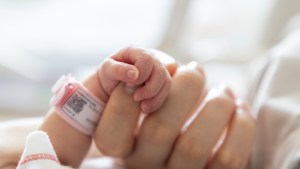The father of a little girl who died in England after courts there ruled she should be taken off life support has spoken out against Great Britain’s proposed bill to legalize assisted suicide.
Dean Gregory, whose daughter, Indi Gregory, died in November 2023 after a protracted legal battle to save her life, said that a safeguard built into the proposed assisted suicide law is “meaningless” and that courts cannot be trusted to make the right decision in life-or-death situations.
The assisted suicide bill will be debated in Parliament later this month. It would give terminally ill persons in England and Wales the “right” to end their lives.
“Even now, judges sign orders that enforce death, supposedly ‘in a patient’s best interests.’ It’s hard to imagine any judge upholding safeguards by questioning what they are being told by medical professionals, patients, or family members,” Gregory said, according to Christian Concern, an organization that helped him and his wife, Claire Staniforth, fight for their daughter’s life last year.
The Member of Parliament who introduced the Terminally Ill Adults (End of Life) Bill, Kim Leadbeater, said the bill contains “the strictest protections and safeguards of any legislation anywhere in the world.”
The Catholic Herald explained that according to the proposal, to be eligible for assisted suicide, a person must be over 18 years old, resident in England and Wales and registered with a general practitioner for at least 12 months, and have the mental capacity to make a choice about the end of his or her life.
“The person must be terminally ill and expected to die within six months and be free from coercion or pressure,” the newspaper said. “Two doctors and a High Court judge must approve their application and there must be a ‘cooling off’ period of up to 21 days from the first assessments unless the patient is expected to die imminently.”
Slippery slope
Born February 24, 2023, with a mitochondrial disease, Indi Gregory had received multiple surgeries and medical intervention at Queen’s Medical Centre in Nottingham, England. Her condition left her with brain damage. Her parents resisted the recommendation of her physicians to remove her from life support. Doctors testified in court that continued medical interventions were causing her severe pain and suffering and that the procedures offered little hope for recovery. They said her condition was irreversible and incurable, and that she did not have much time to live.
Justice Robert Peel of Britain’s High Court agreed with the nation’s health system authorities, the NHS Trust, and ordered that life support be removed. The Bambino Gesù Children’s Hospital in Rome had offered to help her, but the judge forbade the trip. In the end he ordered that life support be removed in hospital or in a hospice, dashing the parents’ last hope that she at least be allowed to die at home.
Cardinal Vincent Nichols, archbishop of Westminster, in a pastoral letter issued October 10, spoke out against the new bill. He argued that in every country in which such a law has been passed, the circumstances in which the taking of a life is permitted are continually widened, making assisted suicide and medical killing, or euthanasia, more and more available and accepted.





